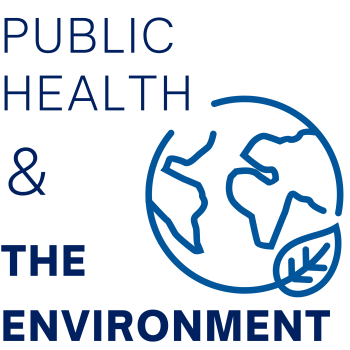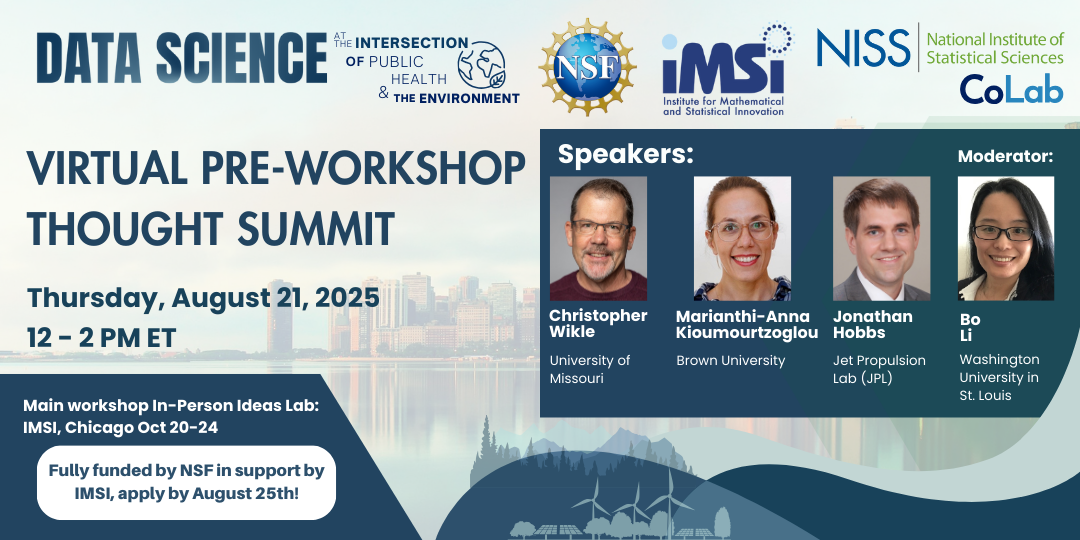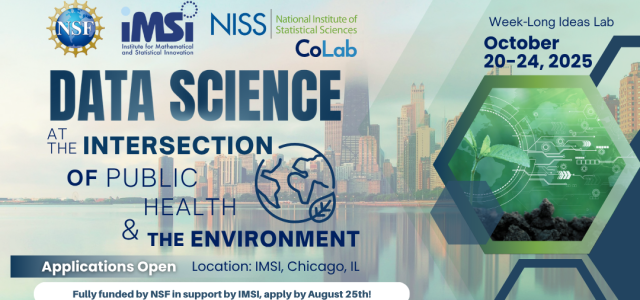Please Note: this event has already taken place. You may find the news story along with the recording of the event here: Virtual Thought Summit Explores Data Science at the Intersection of Public Health and the Environment | National Institute of Statistical Sciences
Overview
Join us for a dynamic and thought-provoking virtual summit exploring how data science is transforming our understanding of environmental impacts on public health. This interdisciplinary conversation will feature a panel of invited experts who will each share brief opening remarks on emerging challenges, opportunities, and ideas at the intersection of data science, environmental science, and public health. A moderated group discussion will follow, aimed at identifying key themes and questions to help shape the October in-person Ideas Lab Workshop.
Featured Panelists
Jonathan Hobbs – Jet Propulsion Laboratory (JPL)
Specializing in Earth observation and environmental data systems, Jonathan will share how satellite data is being used to monitor environmental health indicators and inform public health strategies.
Chris Wikle – University of Missouri
A pioneer in spatio-temporal modeling, Chris will discuss statistical approaches to understanding complex environmental systems and their interactions with human health.
Marianthi-Anna Kioumourtzoglou – Brown University
An expert in environmental epidemiology, Marianthi-Anna will explore how data science is helping uncover links between pollution exposure and health outcomes across populations.
Moderator
Bo Li - Washington University (WashU) in St. Louis
Stanley A. Sawyer Professor in the Department of Statistics and Data Science and Co-director of the Transdisciplinary Institute in Applied Data Sciences at Washington University (WashU) in St. Louis.
Key Discussion Points
- Urgent challenges at the intersection of public health and environmental crises where data science can drive meaningful impact over the next decade
- Emerging methodological innovations in statistical modeling, machine learning, and data collection that could transform research at this intersection
- Role of causal inference methods in translating environmental exposure data into actionable policy insights
- Use of mathematical models to detect and anticipate joint tipping points in environmental and human health systems
- Strategies for integrating and harmonizing diverse datasets, including epidemiological registries, environmental monitoring, and biodiversity surveys
- Applications of species abundance and diversity models to inform ecosystem and public health decision-making
- Co-modeling approaches to capture cascading effects of extreme events such as wildfires, droughts, and epidemics
- Balancing innovation in data sources—like satellite imagery, wearable sensors, and community-level reporting—with concerns around data quality, privacy, and representativeness
- Adapting sampling strategies to maintain robust data under increasing uncertainty due to climate change
- Structuring transdisciplinary collaboration among statisticians, environmental scientists, and public health experts to address complex challenges
About the Panelists
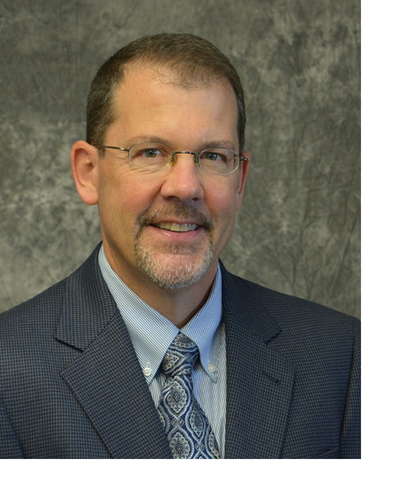 Christopher K. Wikle is Curators’ Distinguished Professor of Statistics at the University of Missouri (MU), with additional appointments in Soil, Environmental and Atmospheric Sciences and the Truman School of Public Affairs. He received a PhD co-major in Statistics and Atmospheric Science in 1996 from Iowa State University. He was research fellow at the National Center for Atmospheric Research from 1996-1998, after which he joined the MU Department of Statistics. His research interests are in spatial and spatio-temporal statistics applied to environmental, ecological, geophysical, agricultural and federal survey applications, with particular interest in dynamics. His work has been concerned with formulating computationally efficient deep hierarchical Bayesian models motivated by scientific principles, with more recent work at the interface of deep neural models in machine learning. Awards include elected Fellow of the American Statistical Association (ASA), Institute of Mathematical Statistics (IMS), elected Fellow of the International Statistical Institute (ISI), Distinguished Alumni Award from the College of Liberal Arts and Sciences at Iowa State University, ASA Environmental (ENVR) Section Distinguished Achievement Award, co-awardee 2017 ASA Statistical Partnership Among Academe, Industry, and Government (SPAIG) Award, the MU Chancellor’s Award for Outstanding Research and Creative Activity in the Physical and Mathematical Sciences, the Outstanding Graduate Faculty Award, and Outstanding Undergraduate Research Mentor Award. His book Statistics for Spatio-Temporal Data (co-authored with Noel Cressie) was the 2011 PROSE Award winner for excellence in the Mathematics Category by the Association of American Publishers and the 2013 DeGroot Prize winner from the International Society for Bayesian Analysis. His latest book, Spatio-Temporal Statistics with R, with Andrew Zammit-Mangion and Noel Cressie, was published in 2019 and won the 2019 Taylor and Francis award for Outstanding Reference/Monograph in the Science and Medicine category. Dr. Wikle is Associate Editor for several journals and is one of six inaugural members of the Statistics Board of Reviewing Editors for Science.
Christopher K. Wikle is Curators’ Distinguished Professor of Statistics at the University of Missouri (MU), with additional appointments in Soil, Environmental and Atmospheric Sciences and the Truman School of Public Affairs. He received a PhD co-major in Statistics and Atmospheric Science in 1996 from Iowa State University. He was research fellow at the National Center for Atmospheric Research from 1996-1998, after which he joined the MU Department of Statistics. His research interests are in spatial and spatio-temporal statistics applied to environmental, ecological, geophysical, agricultural and federal survey applications, with particular interest in dynamics. His work has been concerned with formulating computationally efficient deep hierarchical Bayesian models motivated by scientific principles, with more recent work at the interface of deep neural models in machine learning. Awards include elected Fellow of the American Statistical Association (ASA), Institute of Mathematical Statistics (IMS), elected Fellow of the International Statistical Institute (ISI), Distinguished Alumni Award from the College of Liberal Arts and Sciences at Iowa State University, ASA Environmental (ENVR) Section Distinguished Achievement Award, co-awardee 2017 ASA Statistical Partnership Among Academe, Industry, and Government (SPAIG) Award, the MU Chancellor’s Award for Outstanding Research and Creative Activity in the Physical and Mathematical Sciences, the Outstanding Graduate Faculty Award, and Outstanding Undergraduate Research Mentor Award. His book Statistics for Spatio-Temporal Data (co-authored with Noel Cressie) was the 2011 PROSE Award winner for excellence in the Mathematics Category by the Association of American Publishers and the 2013 DeGroot Prize winner from the International Society for Bayesian Analysis. His latest book, Spatio-Temporal Statistics with R, with Andrew Zammit-Mangion and Noel Cressie, was published in 2019 and won the 2019 Taylor and Francis award for Outstanding Reference/Monograph in the Science and Medicine category. Dr. Wikle is Associate Editor for several journals and is one of six inaugural members of the Statistics Board of Reviewing Editors for Science.
 Marianthi-Anna Kioumourtzoglou is renowned not only for her research and academic excellence but also for her dedication to mentoring and fostering a collaborative academic environment wherever she goes. Just to name a few of her accolades, she has received numerous best paper awards from the NIEHS Environmental Factor, AJE, and American Statistical Association, she was awarded the ISEE Tony McMichael Mid-Term Career award in 2023 and the Dean's Excellence in Mentoring award in 2022. Marianthi also received special recognition in both 2021 and 2024 for her top-tier peer reviewing and was included in the 2018 list of the best reviewers of the year in the American Journal of Epidemiology.
Marianthi-Anna Kioumourtzoglou is renowned not only for her research and academic excellence but also for her dedication to mentoring and fostering a collaborative academic environment wherever she goes. Just to name a few of her accolades, she has received numerous best paper awards from the NIEHS Environmental Factor, AJE, and American Statistical Association, she was awarded the ISEE Tony McMichael Mid-Term Career award in 2023 and the Dean's Excellence in Mentoring award in 2022. Marianthi also received special recognition in both 2021 and 2024 for her top-tier peer reviewing and was included in the 2018 list of the best reviewers of the year in the American Journal of Epidemiology.
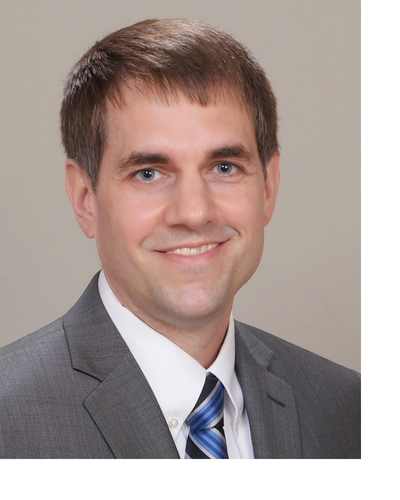 Jonathan Hobbs is a data scientist at the Jet Propulsion Laboratory, California Institute of Technology. As a member of the Uncertainty Quantification (UQ) and Statistical Analysis group, his research has included developing UQ methodology for atmospheric remote sensing retrievals, including simulation-based approaches for the Orbiting Carbon Observatory-2/3 (OCO-2/3) and Atmospheric Infrared Sounder (AIRS). He led a NASA AIST effort on UQ for remote sensing retrievals. In addition, he has substantial experience in development of spatio-temporal statistical methods for geoscience applications, including hydrology, carbon cycle science, and weather. He also has a background in Bayesian analysis of hierarchical statistical models for agricultural, environmental, and social science applications. Jon completed a co-major PhD in statistics and meteorology at Iowa State University, where he had previously earned a BS in meteorology and statistics. His dissertation research combined physical and statistical models to address interannual variability and the diurnal cycle in the atmosphere.
Jonathan Hobbs is a data scientist at the Jet Propulsion Laboratory, California Institute of Technology. As a member of the Uncertainty Quantification (UQ) and Statistical Analysis group, his research has included developing UQ methodology for atmospheric remote sensing retrievals, including simulation-based approaches for the Orbiting Carbon Observatory-2/3 (OCO-2/3) and Atmospheric Infrared Sounder (AIRS). He led a NASA AIST effort on UQ for remote sensing retrievals. In addition, he has substantial experience in development of spatio-temporal statistical methods for geoscience applications, including hydrology, carbon cycle science, and weather. He also has a background in Bayesian analysis of hierarchical statistical models for agricultural, environmental, and social science applications. Jon completed a co-major PhD in statistics and meteorology at Iowa State University, where he had previously earned a BS in meteorology and statistics. His dissertation research combined physical and statistical models to address interannual variability and the diurnal cycle in the atmosphere.
About the Moderator
 Dr. Bo Li is a Stanley A. Sawyer Professor in the Department of Statistics and Data Science and Co-director of the Transdisciplinary Institute in Applied Data Sciences at Washington University (WashU) in St. Louis. She received her PhD in Statistics from Texas A&M University in 2006 and then became a Post-Doc at the National Center for Atmospheric Research. Dr. Li began her academic career at Purdue University in 2008 and then moved to the University of Illinois Urbana-Champaign (UIUC) in 2013. Before moving to WashU in 2024, Dr. Li served as Marjorie Roberts Professor and Chair of the Department of Statistics at UIUC. Dr. Li’s research focuses on spatial and spatiotemporal statistics, and environmental applications to broad areas such as atmospheric sciences, climatology, public health, agriculture, ecology and forestry.
Dr. Bo Li is a Stanley A. Sawyer Professor in the Department of Statistics and Data Science and Co-director of the Transdisciplinary Institute in Applied Data Sciences at Washington University (WashU) in St. Louis. She received her PhD in Statistics from Texas A&M University in 2006 and then became a Post-Doc at the National Center for Atmospheric Research. Dr. Li began her academic career at Purdue University in 2008 and then moved to the University of Illinois Urbana-Champaign (UIUC) in 2013. Before moving to WashU in 2024, Dr. Li served as Marjorie Roberts Professor and Chair of the Department of Statistics at UIUC. Dr. Li’s research focuses on spatial and spatiotemporal statistics, and environmental applications to broad areas such as atmospheric sciences, climatology, public health, agriculture, ecology and forestry.
About the Data Science at the Intersection of Public Health and the Environment - Ideas Lab (Workshop)
Overview
IMSI and the National Institute of Statistical Sciences (NISS) are organizing a workshop on Data Science at the Intersection of Public Health and the Environment. This event will bring together experts from diverse fields to explore innovative methodologies, foster collaboration, and address pressing challenges in public and environmental health using data science techniques.
Download Flyer: ![]() Flyer 8.5x11 IMSI-NISS Data Science Health & Environment.pdf
Flyer 8.5x11 IMSI-NISS Data Science Health & Environment.pdf
See full details on event page: Data Science at the Intersection of Public Health and the Environment - Ideas Lab (Workshop)
Key Research Areas:
- New inferential approaches: Summarizing, linking, and analyzing diverse datasets from epidemiological studies, health registries, environmental monitoring, and surveys to uncover shared patterns, trends, associations, and causal relationships.
- Species abundance and diversity modeling: Leveraging big data to assess ecosystem and biodiversity health across different spatial and temporal resolutions.
- Innovative sampling techniques: Designing efficient and representative data collection methods while quantifying variability, bias, and uncertainty in joint environmental and health studies.
- Co-modeling of extremes: Developing methodologies to model the probability and magnitude of rare events in both environmental and human health domains (e.g., floods, wildfires, droughts, pandemics, food insecurity).
- Mathematical modeling of environmental systems: Simulating biological, physical, and chemical processes, hypothesizing tipping points, and integrating causal models to assess intervention impacts.
Event Type
- NISS Hosted
Host
Cost
Website
Location
Policy
